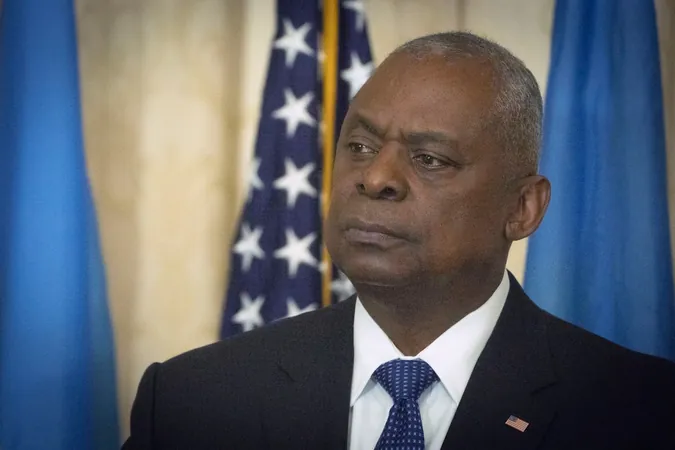
Pentagon's Attempts to Dismiss 9/11 Plea Deals Thwarted by Court Ruling
2024-12-31
Author: Emily
Pentagon's Legal Setback
In a significant legal setback for Defense Secretary Lloyd Austin, a military appeals court has unanimously ruled against his attempt to nullify plea deals made for three key defendants in the 9/11 terror attacks, including the alleged mastermind, Khalid Sheikh Mohammed. This ruling, revealed by a U.S. official who spoke on the condition of anonymity, reignites efforts to finalize agreements that allow the defendants to plead guilty in exchange for avoiding the death penalty.
Background of the Case
The plea deals, which have been under negotiation for the past two years, emerged from a protracted legal struggle revolving around the crimes committed on September 11, 2001, when nearly 3,000 lives were lost to the coordinated attacks by the al-Qaeda terrorist group. The aftermath of these attacks catalyzed the U.S. military's involvement in Iraq and Afghanistan, actions branded as part of the George W. Bush administration's 'war on terror.'
Pretrial Challenges
The military court's decision, announced Monday evening, brings renewed momentum to a case that has seen pretrial hearings dragging on for over a decade at the Guantanamo Bay detention facility. Much of the legal wrangling centers around concerns regarding the coercive interrogation methods used by the CIA in the early days of the defendants' detention, which many argue compromise the integrity of the evidence presented against them.
Austin's Nullification Attempt
Earlier this summer, upon hearing news about the plea agreements, Austin swiftly moved to nullify them, citing the severity of the 9/11 attacks and asserting that, as defense secretary, he held the authority to oversee such critical decisions related to capital punishment. However, legal experts and defense attorneys quickly contest that Austin lacked the jurisdiction to overturn the court’s approved agreements, labeling his actions as unlawful interference.
Court's Support for the Agreement
The case has attracted intense scrutiny, and the military judge presiding over it, Air Force Colonel Matthew McCall, supported the argument that Austin had exceeded his rights in this context, prompting the Pentagon's subsequent appeal to the military appeals court.
Future Implications
Looking ahead, Austin may elect to escalate his challenge to the U.S. Court of Appeals for the District of Columbia Circuit, as the Pentagon continues to navigate the complex landscape of military justice.
Related Developments in Guantanamo
In a separate but related development, the Pentagon has reported the repatriation of Ridah bin Saleh al-Yazidi, one of the longest-held detainees at Guantanamo, who returned to Tunisia after being approved for transfer more than ten years ago. His departure reduces the detainee population at Guantanamo to 26, a steep decline from the approximately 700 individuals who were incarcerated there shortly after the 9/11 attacks.
Debate Over Guantanamo's Future
Al-Yazidi's repatriation marks a notable moment in the ongoing debate over the future of the Guantanamo facility, especially with 14 men currently awaiting transfer to other countries after being cleared of prosecution and deemed no longer a security threat.
Call for Expedited Transfers
The Biden administration faces ongoing pressure from human rights advocates to release remaining detainees who have not faced charges, moving to expedite transfers of three individuals this month alone. The search remains active for stable countries willing to accept the remaining detainees, as discussions continue about the ongoing implications of the U.S.'s post-9/11 detention policies.
Conclusion
As developments unfold, this case represents not only the legal complexities surrounding the 9/11 attacks but also the broader challenges posed by the continued existence of Guantanamo Bay—an emblem of the challenges the United States faces in reconciling national security interests with the principles of justice and human rights.



 Brasil (PT)
Brasil (PT)
 Canada (EN)
Canada (EN)
 Chile (ES)
Chile (ES)
 Česko (CS)
Česko (CS)
 대한민국 (KO)
대한민국 (KO)
 España (ES)
España (ES)
 France (FR)
France (FR)
 Hong Kong (EN)
Hong Kong (EN)
 Italia (IT)
Italia (IT)
 日本 (JA)
日本 (JA)
 Magyarország (HU)
Magyarország (HU)
 Norge (NO)
Norge (NO)
 Polska (PL)
Polska (PL)
 Schweiz (DE)
Schweiz (DE)
 Singapore (EN)
Singapore (EN)
 Sverige (SV)
Sverige (SV)
 Suomi (FI)
Suomi (FI)
 Türkiye (TR)
Türkiye (TR)
 الإمارات العربية المتحدة (AR)
الإمارات العربية المتحدة (AR)